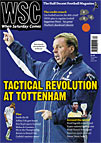 Is it possible for Jamie to comment fairly on Harry?
Is it possible for Jamie to comment fairly on Harry?
It was no surprise that Harry Redknapp’s appointment as Spurs boss a few days later met with almost universal approval in the press. Most football journalists seem to love Redknapp – while many managers treat reporters with varying degrees of suspicion, he’s affable, talkative and funny, a constant source of good copy. In among the many phone calls he apparently made in the hours after his departure from Portsmouth around midnight on Saturday was a characteristic quip, reflecting on the £5 million compensation agreed with his ex-employers: “Pompey couldn’t sell a player in the window so we sell the manager.”
There’s nothing wrong with a manager cultivating the press and putting on a bit of a show – it’s infinitely preferable to the sort of witless aggression recently unleashed by Joe Kinnear. But Redknapp has gone beyond cordiality, to friendship with people supposed to be neutral. And his uncomplicated bonhomie has not made him quite such a widely popular figure outside of the sports departments of the national newspapers. The reasons for this are encapsulated in a comment made by Daniel Levy: “It is the right time for us to return to a traditional style of football management at our club.” The Spurs chairman was referring to the fact that he would not be replacing the widely criticised director of football, Damien Comolli, meaning Redknapp will be more directly involved in transfer dealings than his two immediate predecessors.
Redknapp has complained at being perceived as a “barrowboy”, but he would have to concede that he enjoys buying and selling players, given the huge number of deals he has done at all his clubs. He says this is a consequence of his usually having taken over struggling teams badly in need of new faces. But while he has had notable successes – taking Bournemouth to the second level for the first time in their history and winning promotion and the FA Cup with Portsmouth – expansive spending policies have left his various clubs with huge debts.
This is partly down to a gambler’s instinct that, it is true, has often paid off on the pitch – although some critics have appeared to suggest that it is more than simple irresponsibility. In his award-winning book Broken Dreams, journalist Tom Bower meticulously detailed the frenetic whirl of transactions that took place during Redknapp’s time in charge at West Ham. Redknapp threatened legal action, which is yet to be forthcoming – unlike updated editions of the book. Nor has Redknapp followed through with the promised action over a seemingly innocuous appearance in the Panorama about alleged corruption among football agents. He is, however, suing police who raided his home earlier this year in relation to an investigation into the business dealings of a players’ agent, Willie McKay.
Long before that is cleared up we can expect to see Spurs comfortably clear of relegation danger if their start under Redknapp is anything to go by. After the inept dealings of recent years, they have at least appointed someone who knows the market inside out. Spurs’ botched attempts at using the continental system, with a director of football, seemed almost designed to prevent any blame for poor results resting on the board while accidentally promoting on-field struggles, so a return to a conventional structure was the correct decision. But Redknapp is not a conventional manager.
Sky has, sensibly, reworked its deservedly popular Soccer Saturday show so that partisans of a team do not describe matches of their old clubs. The habit of one pundit from each team for a live game remains, however, yet Redknapp junior is in theory Richard Keys’ “neutral” accompaniment; even when paired with Alan Smith, as he was for Spurs’ 4-4 thriller at Arsenal, he has seniority and can dominate proceedings. His cloying loyalty to Liverpool can outstrip that of the older former Reds elsewhere in the media; he is over-protective of his cousin, Frank Lampard; and now, with all due respect to Portsmouth, his father is in charge of a club much more in the spotlight.
Jamie could not be enticed away to a coaching role at Spurs, alas, so we seem to be stuck with him. But his presence does serve a purpose, highlighting Sky’s problem with handling controversy in a sport they depend on. The closeness of father and son is natural; what is avoidable is having him as a journalist discussing Harry’s colourful life – or, worse, not discussing it, as debate is silenced. Yet Jamie is simply an extreme example of a profession all too happy to cosy up to those who should be under its scrutiny, something all too familiar from the years when Terry Venables was the game’s most colourful wheeler-dealer.
From WSC 262 December 2008